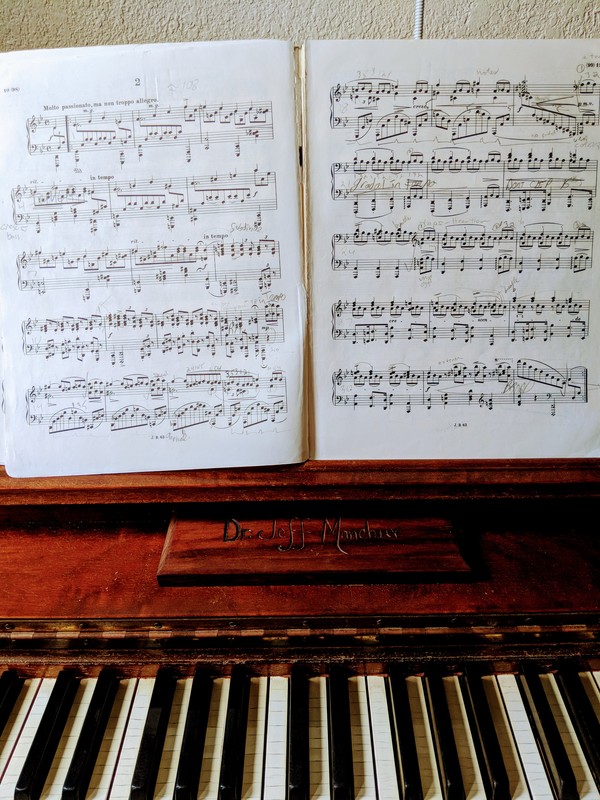that some of the more virtuosic elements of the piece (simple as they seem to me now) were a struggle. I could tense up in the big chordal or octave sections and I imagine my rhythm suffered terribly, as did sound and voicing. I think it's also the reason I hit some clunkers; say in M. 5-6, I'm holding a fixed hand position as I shift positions and never establish the new positioning.
But this piece is a particularly dangerous one if you can't sing at the piano. It's almost made to be played "beaty", that is, EVry SINGle BEAT sounds the SAME. The first two phrases share the melody between the hands, and the homorhythmic nature, AND the range of the melody lends itself to be played so badly, so easily. I know that we worked so hard on creating a singing line, and instilling an organic rubato. At this point, even though I'd been playing it for several years off and on, you can hear the artificiality of some of my musicality. Consider the beginning. First of all, the tempo is too slow (perhaps to aide some technical struggles later. You can hear that I speed up for beats two and three, and I bet that was something we were trying intentionally, to move the phrase forward. Secondly, I make a HUGE agogic accent on the F in measure two. I'm sure my teacher was trying to get me to highlight the highpoint of the phrase, but it sounds so fake here. I do like the section that follows pretty well. I think I have a nice staccato to accent timing in measure 9 and 11. I wish measures 10 and 12 would drive just a bit more, but overall I think the musicality is natural. I remember in the "nocturne" that follows, M. 14-20, we worked a lot on rubato...I think I spend a little too much time "enjoying" the pic-up measures and they become monotonous. But, I like the sound here. Something I'm quite pleased with is the laying of voices in M. 65-82. Here in the development, takes the technique of the opening, but changes the monotonous rhythm so that the principle melody is dotted half-note and quarter-note, leaving the hand crossing in place as a filler voice. I think I highlight this rather well, and am glad I don't try to "correct" Brahms by playing the melody as if it were written the same as in the exposition. My favorite part of this piece has always been the closing theme in the exposition, and especially in the recapitulation. There's something about that surging left hand that sounds so triumphant, even in the minor key. I know my teacher warned me not to playing everything too loudly. I'm sure I was just banging, but following the advice, you hear me pull back in measure 112, again, so artificially. If I encountered a student banging in something like this, I'd encourage them to think more lyrically within forte/fortissimo, leaving the relative dynamic level untouched. So it's interesting, the first old personal recording I had, I probably remembered as worse than it actually was. I would have thought that this oft-played piece from my late teens or early twenties would have come off better. But I'd take my playing in that Haydn any day over this Brahms. (I should rerecord this Brahms!) |
"Modern performers seem to regard their performances as texts rather than acts, and to prepare for them with the same goal as present-day textual editors: to clear away accretions. Not that this is not a laudable and necessary step; but what is an ultimate step for an editor should be only a first step for a performer, as the very temporal relationship between the functions of editing and performing already suggests." -Richard Taruskin, Text and Act Archives
March 2021
Categories
All
|

 RSS Feed
RSS Feed
